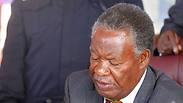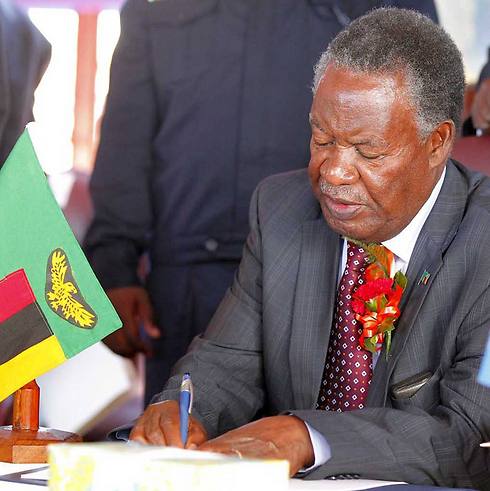
Michael Sata: From porter to president
Photo: AFP
LUSAKA, Zambia -- Zambian leader Michael Sata, a longtime opposition leader who was finally elected president in 2011, died after an illness, the Zambian government said Wednesday. The Cabinet held a meeting to discuss a political transition, which would include elections within 90 days in the southern African nation.
Sata died shortly after 11 pm on Tuesday at London's King Edward VII hospital, where he was being treated, Cabinet secretary Roland Msiska said in a statement.
Sata's wife, Christine Kaseba, and his son, Mulenga Sata, were at the 77-year-old president's side when he died, Msiska said. Mulenga Sata is the mayor of the Zambian capital, Lusaka.
"I urge all of you to remain calm, united and peaceful during this very difficult period," Msiska said in an appeal to Zambians.
The Cabinet discussed plans for a political handover, a Zambian official said. The official spoke on condition of anonymity because he is not authorized to speak to the media. Article 38 of the Zambian constitution requires that presidential elections be held within 90 days of the president's death.
Defense Minister Edgar Lungu was appointed acting president when Sata traveled to London earlier this month. The vice president is Guy Scott, a white Zambian whose appointment in 2011 caused a stir in Zambia. Scott previously held the post of agriculture minister, and has also worked in Zambia's finance ministry.
Rumors that Sata was deathly ill had gripped Zambia since the leader largely dropped out of public view months ago, and opposition groups had questioned whether Sata was fit to lead a country of 15 million people that has enjoyed robust economic growth but suffers widespread poverty.
On Sept. 19, Sata delivered an address at the opening of parliament in Lusaka, poking fun at speculation about his failing health.
"I haven't died yet," the Zambian president said at the time.
Following that appearance, Sata failed to give a scheduled address at the United Nations in New York and police said doctors treated him in a hotel room.
Earlier this year, Sata traveled to Israel amid widespread speculation that he went there for medical treatment. On Oct. 20, the Zambian government said Sata had left for a "medical check-up abroad," without mentioning that he had gone to London.
Sata has been called "Mr. King Cobra" for his sharp-tongued remarks. He has had a mixed relationship with Chinese investors in Zambian mines and other infrastructure, criticizing them as exploitative but toning down his rhetoric after taking office.
Some critics say Sata became increasingly intolerant in the presidency. An opposition leader, Frank Bwalya, was acquitted this year of defamation charges after he compared Sata to a local potato whose name is slang for someone who doesn't listen.
Sata had been a perennial opposition leader, losing three presidential votes. He finally broke the jinx to become Zambia's fifth president in 2011. He also has served in previous governments, and was a member of every major party.
Sata was born in Mpika in what was then northern Rhodesia, and worked as a police officer under colonial rule and a trade unionist before becoming a politician in 1963. He also trained as a pilot in Russia.
After independence from Britain in 1964, he joined Kenneth Kaunda's United National Independent Party, becoming governor of Lusaka, a city as well as a province, in 1985.
He resigned from Kaunda's party in 1991 and joined the newly formed Movement for Multiparty Democracy, later serving as a party lawmaker for 10 years and as minister for local government, labor and social security, and health.
In 2001, he left to form his Patriotic Front party. Five years later, Sata was arrested for allegedly making false property claims. He faced at least two years in prison and a ban from politics. The charges were later dropped.
In 2008, he suffered a stroke and went to South Africa for treatment. The same year, President Levy Mwanawasa died following a stroke and a special election held later saw Sata narrowly losing to Rupiah Banda, who had been Mwanawasa's vice president.
Sata and his wife, Kaseba, had eight children.
















